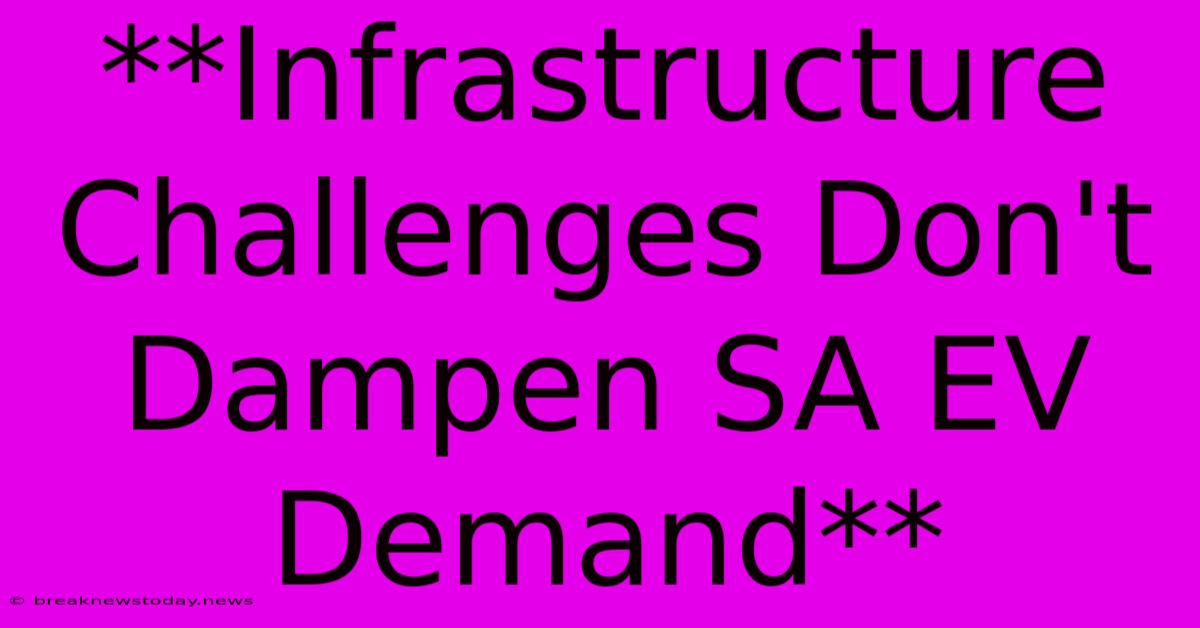**Infrastructure Challenges Don't Dampen SA EV Demand**

Discover more detailed and exciting information on our website. Click the link below to start your adventure: Visit Best Website naughtynakes.com. Don't miss out!
Table of Contents
Infrastructure Challenges Don't Dampen SA EV Demand
South Africa's transition to electric vehicles (EVs) is gaining momentum despite notable infrastructure challenges. While the country faces hurdles in building a robust charging network and accessing affordable electricity, the demand for EVs remains strong, driven by factors like rising fuel costs, environmental concerns, and government incentives.
EV Adoption in South Africa: A Growing Trend
The South African EV market is witnessing a steady rise in demand, with consumers increasingly opting for eco-friendly alternatives to traditional petrol and diesel cars. This trend is fueled by:
- High fuel prices: As fuel costs continue to escalate, the cost savings offered by EVs become increasingly attractive.
- Environmental concerns: South Africa's commitment to combating climate change has led to growing awareness of the environmental benefits of EVs, including zero tailpipe emissions.
- Government incentives: The government's efforts to promote EV adoption through tax breaks, subsidies, and charging infrastructure development are contributing to a positive market sentiment.
Infrastructure Challenges: A Hurdle to Overcome
Despite the growing demand, South Africa's EV transition faces significant infrastructure challenges:
- Limited charging infrastructure: The country currently has a limited number of public charging stations, creating range anxiety for potential EV buyers.
- Electricity grid limitations: South Africa's electricity grid faces challenges in meeting the increasing demand, including the need for load shedding. This poses a challenge for charging EVs, particularly during peak hours.
- High electricity costs: Despite government efforts, electricity tariffs remain high, impacting the overall cost of ownership for EVs.
Addressing the Infrastructure Gap: Collaborative Efforts
To overcome these challenges, a collaborative approach is needed involving various stakeholders:
- Private sector investment: The government is actively encouraging private sector investment in charging infrastructure development, particularly in major urban centers.
- Public-private partnerships: Collaborations between the government and private companies are essential to accelerate the deployment of charging stations and address grid limitations.
- Technology innovation: The development of advanced battery technology and renewable energy solutions can help overcome challenges related to charging infrastructure and grid capacity.
A Promising Future: Embracing the EV Revolution
Despite the challenges, South Africa's EV future remains bright. The growing demand, government incentives, and the ongoing efforts to improve infrastructure are laying the groundwork for a sustainable transition to electric mobility. As the EV ecosystem matures, the country is poised to become a leader in the African EV market, contributing to a greener and more sustainable future.
Keywords: South Africa, EV, electric vehicles, infrastructure, charging stations, demand, fuel prices, government incentives, environmental concerns, challenges, future, transition, renewable energy, sustainability.

Thank you for visiting our website wich cover about **Infrastructure Challenges Don't Dampen SA EV Demand**. We hope the information provided has been useful to you. Feel free to contact us if you have any questions or need further assistance. See you next time and dont miss to bookmark.
Featured Posts
-
Harry Wood Goal Wins Duffs League Title
Nov 02, 2024
-
Epic Games Shooter Leaks Zu Neuen Features
Nov 02, 2024
-
League Of Ireland Title Race Down To The Wire
Nov 02, 2024
-
Jaguares Vs Pereira Motivos De La Suspension
Nov 02, 2024
-
Willem Herinnert Zich Ontmoeting Met Slimane
Nov 02, 2024
